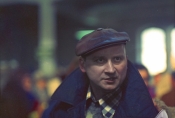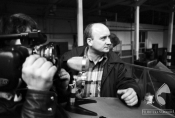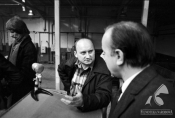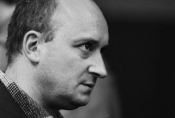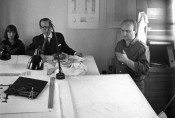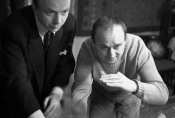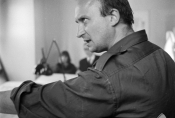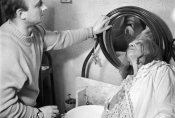Grzegorz Królikiewicz
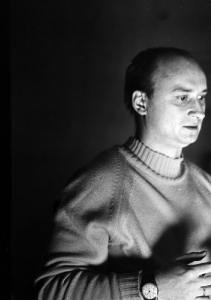
Film, theatre and television director, writer, designer, editor, producer, theorist and educator. He was born on June 5, 1939, in Aleksandrów Kujawski. A graduate of law at the University of Łódź (1962) and the Directing Department of the State School of Theatre and Film in Łódź (1967, diploma in 1970). Prior to his involvement in the arts, he had published interesting theoretical works on cinema, especially the so-called off-frame space. As a professor at the Łódź Film School, he published a number of books which recorded the film analyses he carried out with his students.
After graduation, he made several short documentaries at the “Czołówka” Film Studio in Warsaw (Wierność/Fidelity, 1969, Piosenka/Song, 1971) and Documentary Film Studio in Warsaw (Bracia/Brothers, 1971, Nie płacz/Don’t Cry, 1972). The latter, dedicated to boys who are about to do compulsory military service, won the Bronze Lajkonik at the Krakow festival for original film qualities and accuracy of observation. In 1972, he made his feature film Na wylot/Through and Through, one of the best and most original debuts in the history of Polish cinema. This suspense-filled story, inspired by a famous murder committed by the Malisz couple in the 1930s, impressed above all with its novel form (the use of off-frame space), psychological depth and excellent performances (Franciszek Trzeciak, Anna Nieborowska). Trzeciak won the Zbigniew Cybulski Award for his role, and Królikiewicz – the Josef von Sternberg award, as well as other prestigious honours, including Mannheim and Łagów. In subsequent films starring Trzeciak - Wieczne pretensje/Constant Complaints (1974, awards in Gdańsk) and Tańczący jastrząb/Dancing Hawk (1977, awards in Gdansk and San Remo), based on the famous novel by Julian Kawalec; the director continued making films in a similar vein – expressive and full of significant, subjectively presented content. In 1981, he made his feature film Klejnot wolnego sumienia/The Jewel of Free Conscience, dedicated to the famous parliamentary Act of 1573 (Confederation of Warsaw). It is worth noting that earlier he had made several television shows, also characterised by their unconventional form: Trzeci Maja/Third of May (1976, Golden Screen), Faust (1976), Kronika Polska Galla Anonima/The Chronicle of Poland by Gall the Anonymous (1977), Idea i miecz/The Idea and the Sword (1978). In the years 1976-1978, he was the head of the editorial board of the Theatre of Fact of Polish Television.
Since then, television shows, theatre productions and documentaries have begun to dominate his work. Feature films have been fewer and fewer: in 1983, he made Fort 13, a dense psychological drama about two Russian officers buried during the First World War in the basement of the fortress of Przemyśl; a year later – Zabicie ciotki/Killing of an Aunt, based on the famous novel by Andrzej Bursa; in 1993 – Przypadek Pekosińskiego/Pekosiński’s Case (1993, Golden Lions in Gdynia, awards in Karlovy Vary and Łagów), an attempt to reconstruct the biography of a mysterious man, an expert chess player, sick and nervous, about whom nothing is known, and who is named after an institution. From his documentaries Królikiewicz deserves special attention: Prekursor/Precursor (1988, awards in Krakow and Łódź), dedicated to Marian Mazur, the world-renowned cyberneticist, Idź/Go (1989, Bronze Lajkonik in Krakow), the moving story about the last journey of an old horse led to the top of a high mountain where it will become food for a protected bear, and Scytowie/The Scythians (1992, awards in Chicago, Troyes, Nyon), inspired by the famous poem of Alexander Blok, and plays – Wieczernik/The Last Supper Room (2001), a TV adaptation of Ernest Bryll’s play.
In the years 1981-1983, Grzegorz Królikiewicz was the artistic director of the "Aneks” Film Studio, and in 2003-2005, he served as the artistic director of the Nowy Theatre in Łódź. Since 1981, he has been a lecturer at the Łódź Film School; he has also taught film studies at the University of Łódź, the Department of Radio and Television at the University of Silesia, and the Melchior Wańkowicz Higher School of Journalism in Warsaw.
He was awarded the Order of Polonia Restituta (2011).
Jerzy Armata
Selected filmography
-
1972
STRAIGHT THROUGH
-
1993
PEKOSIŃSKI’S CASE
